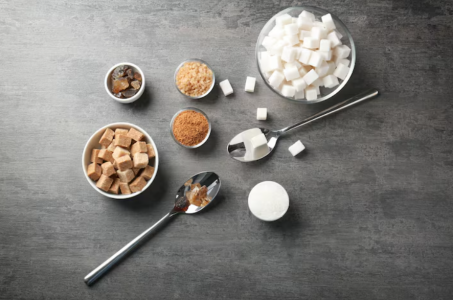Are you using the right sugar substitute? Dietitians reveal the top picks for managing blood sugar
- Replies 0
If you’ve ever paused at your morning coffee and wondered whether those colorful little sweetener packets are really better for your blood sugar than plain sugar, you’re not alone.
Many people are rethinking the way they satisfy their sweet tooth—especially as new options like stevia, monk fruit, and allulose appear on grocery shelves.
For those living with diabetes, prediabetes, or simply hoping to keep their energy balanced, choosing the right substitute can make a big difference.
But which ones actually help—and which are just clever marketing?
But even if you don’t fall into those categories, keeping your blood sugar steady is key to feeling your best—think more energy, fewer mood swings, and a lower risk of chronic disease.
When you eat food high in added sugars (think sodas, pastries, and even some “healthy” granolas), your blood sugar can spike and then crash, leaving you tired, cranky, and craving more sweets.
That’s where sugar substitutes come in: they offer the sweet taste people love, but with little to no impact on blood sugar.
Sugar substitutes, on the other hand, “provide the sensation of sweetness without digestible carbohydrates, so they minimally impact glucose and often don’t have any calories or carbohydrates associated with them,” adds Janelle Bober, M.S., RDN.
But not all sugar substitutes are created equal. Let’s break down the options, from natural to artificial, and see what the latest research (and real-life experience) says.
How does it affect blood sugar? A recent meta-analysis found that stevia can significantly lower blood glucose, especially in people with diabetes, high blood pressure, or a higher BMI.
How to use it: Because it’s so sweet, you’ll need much less than regular sugar. It works well in coffee, tea, and even some baked goods (though it can have a slight aftertaste).
Health perks: Monk fruit may have anti-inflammatory and antioxidant properties. Studies show it doesn’t raise blood glucose or stimulate insulin the way sugar does.
How to use it: Great for sweetening drinks, yogurt, or oatmeal. Some people find it has a “cleaner” taste than stevia.
How does it work? Most allulose is absorbed in the small intestine but excreted in urine, so it doesn’t contribute calories or raise blood sugar. Some research even suggests it may help slow the absorption of glucose from other foods.
How to use it: Allulose tastes and bakes like sugar, making it a favorite for cookies, cakes, and other treats.
Blood sugar impact: Research shows erythritol has minimal effect on blood sugar and insulin. It’s mostly excreted in urine.
How to use it: Works well in baking and beverages, but too much can cause digestive upset in some people (think bloating or gas).
Source: gabbituft / Instagram
Also read: Could this vitamin play a role in lowering blood sugar?
Bottom line: Safe for most, but if you notice digestive issues or changes in how you feel, consider switching it up.
Bottom line: Generally safe, but some people report headaches or sensitivity.
Bottom line: Use in moderation, and pay attention to how your body responds.
Also read: The surprising bread trick that helps control blood sugar and reduce waste
However, some people may experience digestive issues (especially with sugar alcohols like erythritol) or changes in gut health with long-term, high use of artificial sweeteners.
Pro Tip: If you’re new to sugar substitutes, start slow and see how your body reacts. And remember, just because something is 'sugar-free' doesn’t mean it’s healthy—many sugar-free snacks are still highly processed.

Have you tried any of these sugar substitutes? Which ones do you love (or hate)? Do you have a favorite recipe using stevia, monk fruit, or allulose? What’s your best tip for keeping blood sugar steady?
Many people are rethinking the way they satisfy their sweet tooth—especially as new options like stevia, monk fruit, and allulose appear on grocery shelves.
For those living with diabetes, prediabetes, or simply hoping to keep their energy balanced, choosing the right substitute can make a big difference.
But which ones actually help—and which are just clever marketing?
Why Blood Sugar Matters (Even If You Don’t Have Diabetes)
First, a quick reality check: Over 100 million Americans have prediabetes, and another 38 million are living with diabetes.But even if you don’t fall into those categories, keeping your blood sugar steady is key to feeling your best—think more energy, fewer mood swings, and a lower risk of chronic disease.
When you eat food high in added sugars (think sodas, pastries, and even some “healthy” granolas), your blood sugar can spike and then crash, leaving you tired, cranky, and craving more sweets.
That’s where sugar substitutes come in: they offer the sweet taste people love, but with little to no impact on blood sugar.
How Do Sugar Substitutes Work?
“Regular sugar is a carbohydrate, which can cause blood sugars to go up—a normal part of digestion,” explains Sheila Patterson, RD, CDCES.Sugar substitutes, on the other hand, “provide the sensation of sweetness without digestible carbohydrates, so they minimally impact glucose and often don’t have any calories or carbohydrates associated with them,” adds Janelle Bober, M.S., RDN.
But not all sugar substitutes are created equal. Let’s break down the options, from natural to artificial, and see what the latest research (and real-life experience) says.
The Best Natural Sugar Substitutes:
Natural sugar substitutes are derived from plants and are generally very low in calories. They don’t raise blood glucose the way table sugar does, making them a favorite among dietitians and people managing their blood sugar.1. Stevia
What is it? Stevia comes from the leaves of the stevia plant and is 200–400 times sweeter than sugar.How does it affect blood sugar? A recent meta-analysis found that stevia can significantly lower blood glucose, especially in people with diabetes, high blood pressure, or a higher BMI.
How to use it: Because it’s so sweet, you’ll need much less than regular sugar. It works well in coffee, tea, and even some baked goods (though it can have a slight aftertaste).
2. Monk Fruit
What is it? Monk fruit extract is made from a small melon native to Southeast Asia. It’s also much sweeter than sugar, so a little goes a long way.Health perks: Monk fruit may have anti-inflammatory and antioxidant properties. Studies show it doesn’t raise blood glucose or stimulate insulin the way sugar does.
How to use it: Great for sweetening drinks, yogurt, or oatmeal. Some people find it has a “cleaner” taste than stevia.
3. Allulose
What is it? Allulose is a rare sugar found in small amounts in foods like figs, raisins, and maple syrup.How does it work? Most allulose is absorbed in the small intestine but excreted in urine, so it doesn’t contribute calories or raise blood sugar. Some research even suggests it may help slow the absorption of glucose from other foods.
How to use it: Allulose tastes and bakes like sugar, making it a favorite for cookies, cakes, and other treats.
4. Erythritol
What is it? Erythritol is a sugar alcohol made by fermenting glucose. It’s about 70% as sweet as sugar.Blood sugar impact: Research shows erythritol has minimal effect on blood sugar and insulin. It’s mostly excreted in urine.
How to use it: Works well in baking and beverages, but too much can cause digestive upset in some people (think bloating or gas).
Source: gabbituft / Instagram
Also read: Could this vitamin play a role in lowering blood sugar?
The Scoop on Artificial Sweeteners:
You know these as the colorful packets at the coffee shop: sucralose (yellow), aspartame (blue), and saccharin (pink). They’re all FDA-approved and have been around for decades.1. Sucralose (Splenda)
What the research says: Most studies show sucralose isn’t well absorbed and doesn’t impact blood sugar. However, some research suggests it may affect insulin sensitivity and gut health in certain people.Bottom line: Safe for most, but if you notice digestive issues or changes in how you feel, consider switching it up.
2. Aspartame (Equal, NutraSweet)
What the research says: Aspartame is one of the most studied food additives. Studies show it has little to no effect on blood sugar or insulin.Bottom line: Generally safe, but some people report headaches or sensitivity.
3. Saccharin (Sweet’N Low)
What the research says: Saccharin doesn’t seem to affect blood sugar in most healthy adults, but it may alter gut bacteria, which could impact glucose tolerance over time.Bottom line: Use in moderation, and pay attention to how your body responds.
Also read: The surprising bread trick that helps control blood sugar and reduce waste
Are Sugar Substitutes Safe?
For most people, yes—especially when used in moderation. The FDA has set acceptable daily intake levels for all approved sweeteners, and most of us don’t come close to exceeding them.However, some people may experience digestive issues (especially with sugar alcohols like erythritol) or changes in gut health with long-term, high use of artificial sweeteners.
Pro Tip: If you’re new to sugar substitutes, start slow and see how your body reacts. And remember, just because something is 'sugar-free' doesn’t mean it’s healthy—many sugar-free snacks are still highly processed.
Beyond Sweeteners: Other Tips for Healthy Blood Sugar
Sugar substitutes can help, but they’re just one piece of the puzzle. Here are a few more ways to keep your blood sugar steady:- Eat more fiber: Found in whole grains, fruits, veggies, legumes, nuts, and seeds. Fiber slows digestion and helps prevent blood sugar spikes.
- Pair carbs with protein: Protein is digested slowly and helps balance out the carbs you eat. Try pairing rice with chicken, pasta with pork, or quinoa with tofu.
- Get enough sleep: Poor sleep can make blood sugar harder to control. Aim for 7–8 hours a night.
- Move after meals: A 15-minute walk after eating can help lower blood sugar and aid digestion.
- Experts share 5 tactics to banish artificial sweeteners out of your life for good
- Six everyday foods and drinks dietitians say you may want to rethink after 30
- The overlooked drink that can help you stay hydrated with diabetes, say dietitians
Key Takeaways
- Natural sugar substitutes like stevia, monk fruit, and allulose are low in calories and have minimal impact on blood sugar, making them suitable for those managing diabetes or aiming to reduce sugar intake.
- Artificial sweeteners such as sucralose, aspartame, and saccharin generally do not raise blood sugar but may affect gut health in some people, so consuming them in moderation is recommended.
- Additional strategies for managing blood sugar include increasing dietary fiber, pairing carbohydrates with protein, getting enough sleep, and going for a walk after meals.
- Dietitians advise using all sugar substitutes judiciously, focusing on an overall balanced diet full of vegetables, fruits, and whole grains rather than relying on sweeteners or ultra-processed foods.







